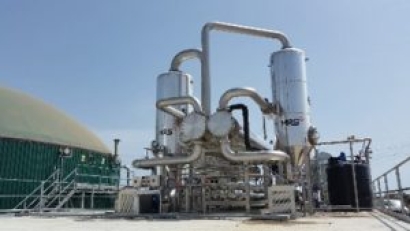
Speaking at a recent Joint Oireachtas Committee meeting on energy security and energy prices, Ryan stressed the importance of biogas to the Republic’s energy plans, with a target of 5.8 TWh of energy from biomethane and anaerobic digestion, being produced from a mixture of grass, food waste and slurry.
Ryan said, “If I recall correctly, that could involve up to 210 anaerobic digestion sites. That could provide about 15% of our gas needs and would give us some security. Anaerobic digestion has huge benefit potential for Irish farming because it gives a diverse and separate income and builds on what we are good at, which is growing grass.”
Meanwhile, at a recent event in Belfast, Hunhe commented, “Northern Ireland is the best placed part of the UK to produce the most biogas and biomethane. It has the potential to meet 80% of its gas demand from this home-grown, cost-effective, and sustainable source thanks to the importance of livestock farming.”
"HRS Heat Exchangers welcomes this ambition to increase biogas production capacity on both sides of the border, but to maximize the greenhouse gas savings from these plants, it is important to also maximize the efficient use of the high quality digestate biofertilizer produced during the AD process, as well as maximising biogas production," said Matt Hale, International Sales & Marketing Director in a press release.
HRS Heat Exchangers provides two systems specifically aimed at improving the efficiency of digestate production and maximizing its value in both nutritional and economic terms.
Digestate Concentration
The HRS DCS uses patented technology to remove up to 80% of the water contained in the liquid fraction and concentrates it to 20% dry solids while, at the same time, maximizing the nutrient content, using heat from the AD plant’s CHP engine.
Less water also means reduced road and field traffic, bringing further benefits in terms of reduced compaction caused by the application of the digestate to land. The DCS is virtually self-sufficient – minimal energy or water is bought in, nothing is wasted, and the surplus energy from the CHP is re-used up to four times.
Another benefit of the DCS is odor control, which helps increase the nutrient content of the digestate. The high temperatures needed to concentrate digestate can cause the release of ammonia, largely responsible for the odours associated with digestate.
However, the DCS overcomes this by acid-dosing the digestate with sulphuric acid, thereby decreasing the pH levels. This turns the ammonia into ammonium sulphate, which is not only less odorous, but is also an ideal nutrient.
Digestate Pasteurisation
The HRS DPS is one of the most cost-efficient methods to pasteurize digestate.
To prevent the spread of potential pathogens which may be present in wastewater, either the feedstock or the digestate should be treated appropriately, with pasteurisation being a tried and tested technique.
One of the most energy-, and therefore cost-efficient methods to pasteurise digestate is the HRS Digestate Pasteurization System (DPS), which is based on heat exchangers rather than tanks with heating jackets. Using heat exchangers means that effective digestate pasteurisation is possible using surplus heat while allowing additional thermal regeneration levels of up to 60%. This saved heat can then be used for other processes, such as evaporation of the digestate to remove water.
"The DPS and DCS are examples of several systems that HRS produce to improve the efficiency and sustainability of biogas plants and the anaerobic digestion process, with other examples including systems to dry biogas and recover waste heat from exhaust systems. Making biogas plants across the island of Ireland as efficient as possible will not only increase the environmental benefits they provide but will also improve economic returns for developers and operators, helping to increase the deployment of this vital technology," said Hale.

